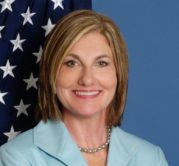You get what you pay for

Nobody wants to pay more taxes. I cringe every December when I see the envelope in my mailbox from the county tax assessor, because I know my tax bill will be increasing.
Public Service Improvements
But then I drive through town and come across work crews filling a pothole that almost cost me a wheel on my car. Or firefighters arrive at my home in minutes to turn off a leaky gas valve. Or I think back to when the police protected our community from the DC sniper. And I know that these are but a few examples of my property tax dollars at work.
For credit unions, your operating fee is comparable to a county tax bill. Just as the county aims to keep the community safe, our goal in constructing NCUA’s budget is to keep the credit union industry safe. We aim to protect your members’ hard-earned deposits, and save you from paying for other credit unions’ losses.
Responsible Budget Increases
NCUA has had to grow to keep up with you, as the industry evolves toward larger and more complex institutions.
While some complain every time NCUA raises the budget, one traditional American value still holds true: “You get what you pay for.”
It’s that simple. Just as you and I pay higher real estate taxes to fund our local government services, credit unions have paid higher operating fees to fund the NCUA budget since the crisis. In return, you have gotten:
- examiners and supervisors with more diverse skill sets;
- specialists with expertise in the most complex financial products and analytics;
- NCUA staff who are better trained to identify emerging risks;
- examinations that are more consistent and more efficient; and
- a safer credit union industry – which translates into fewer credit union failures and smaller losses to be borne by the remaining credit unions.
NCUA now has the resources we need to address the systemic issues that cause credit union failures, because of our responsible budget increases over the past several years.
Gaining Perspective
Let’s keep these budget increases in perspective. Other financial services regulators raised their budgets by as much as 100% in a single year – and they averaged double-digit increases since the crisis.
How do we prevent wide fluctuations in the NCUA budget? We are mindful not to hire more staff than we can train in any given year. And we always work to minimize any increase in credit unions’ operating fees.
Each year begins with zero-based budgeting. Every NCUA office starts with zero authorized funds. Office directors must justify each line item, instead of rolling over budget levels from prior years.
Protecting Your Future
So what can you expect next year? As credit union assets continue to grow, the NCUA budget will need to grow as well. Specifically, as credit unions become even larger and more complex, the total exam hours needed to ensure their safety will increase.
However, this does not necessarily mean a larger exam force. By realigning our regions and improving efficiencies throughout NCUA, we will accommodate the increase in total exam hours without any increase in staff – just as we were able to do this year.
While we will continue to reduce hours spent examining small credit unions, larger and more complex credit unions will see more specialists with expertise in their lines of business. Our intent is to focus on forward-looking risks before they threaten the Share Insurance Fund or your credit union’s future.
For example: Specialists will work with credit unions to adapt to new mortgage market standards, hedge interest rate risks, mitigate cyber-attacks, and practice enterprise risk management, among other things.
Of course more specialized exam teams will require budget increases for travel and training. NCUA’s 2014 National Training Conference will be designed to ensure consistent training of all staff and provide improved technology for staff to do their jobs more efficiently.
Promoting Innovations
NCUA will not hold the credit union industry back. With sufficient budgetary resources, we are poised to help the industry move forward. We will keep up with financial services innovations to better serve consumers and strengthen credit unions. And we will ensure those innovations meet safety and soundness standards.
For instance, the NCUA Board will work to finalize a rule authorizing qualified credit unions to engage in derivatives that mitigate interest rate risks. We will also consider a proposed rule to empower certain credit unions to securitize assets that would facilitate liquidity and generate additional lending.
These new products create new risks that will need to be well managed and expertly supervised. So in anticipation, the 2014 budget will reallocate some general examiner positions toward subject matter examiners who bring expertise in capital markets, investments, and specialized lending.
NCUA’s budget will provide the necessary funding so credit unions can have new authorities and offer innovative services to members. In turn, credit unions will be visited by examiners who understand the complexities of business models with sophisticated products and investments.
Sound Investment
We take stewardship of the NCUA budget very seriously, and we are doing our due diligence to ensure that the NCUA budget is a sound investment for the credit union industry. It’s an investment that will pay off by protecting the Share Insurance Fund, your members’ deposits, and credit unions’ bottom lines. And I assure you: You will get what you pay for.

